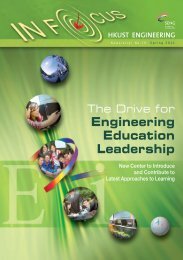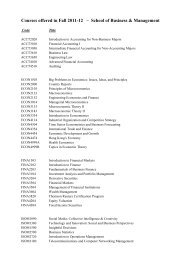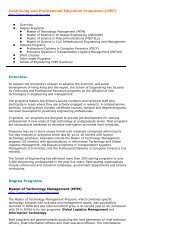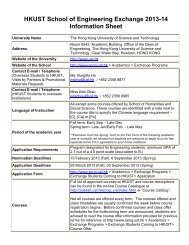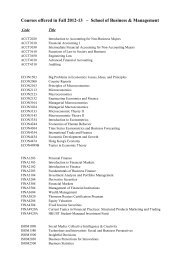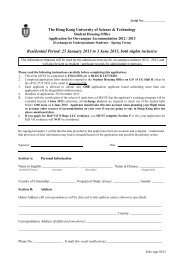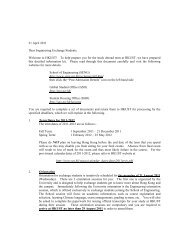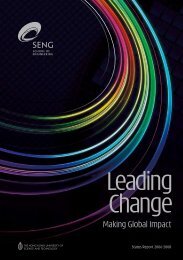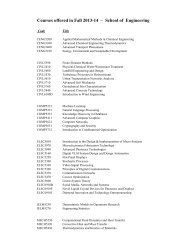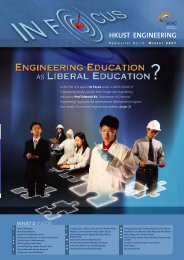pdf version - seng, hkust
pdf version - seng, hkust
pdf version - seng, hkust
You also want an ePaper? Increase the reach of your titles
YUMPU automatically turns print PDFs into web optimized ePapers that Google loves.
Empowering Excellence<br />
52<br />
Department<br />
of Industrial<br />
Engineering<br />
and Logistics<br />
Management<br />
As our name suggests, the Department of Industrial Engineering<br />
and Logistics Management has two major focuses. Over the<br />
past three years, we have continued to develop both these<br />
areas, achieving high international recognition and global<br />
rankings.<br />
In the mid-1990s, our department was the first in Hong Kong to<br />
introduce a logistics management degree to fulfill the city’s need<br />
for professionals and research input as a global logistics hub.<br />
Engineering management is another key aspect of our work<br />
given China’s global position as the world’s factory.<br />
Although our undergraduates choose to focus on either logistics<br />
management or industrial engineering, core courses overlap,<br />
enabling them to seek work in both fields and the business<br />
sector. Such flexibility should be enhanced under the revised<br />
curriculum for the new, four-year undergraduate degree<br />
program. We have also been promoting the outcome-based<br />
education approach for courses.<br />
As part of our drive for continuous improvement, the<br />
Department has established a new interdisciplinary option in<br />
design and marketing in collaboration with the Department of<br />
Marketing at HKUST Business School. Another interdisciplinary<br />
program in financial engineering is also under preparation and<br />
we have employed two faculty members to assist with this<br />
development.<br />
Our research has continued to be successful in gaining funding,<br />
as our Research Highlights show. In addition, senior colleagues<br />
have been involved in industrial interaction, technology transfer<br />
and human resource development, in particular at the Zhejiang<br />
Advanced Manufacturing Institute (ZAMI) of HKUST, which<br />
tackles projects and offers research opportunities on Mainland<br />
China issues. During the period under review, ZAMI worked<br />
with the local government in Zhejiang Province to organize a<br />
well-received corporate leadership training program for mainland<br />
manufacturing industry leaders.<br />
In my four years as Head of Department, I have initiated<br />
a postgraduate student association to enhance research<br />
interaction and social life and made outreach to our alumni<br />
a specific goal. Although we are still a relatively young<br />
department, our alumni have made strides in their careers<br />
and have much to share with our current students and faculty.<br />
In addition, my own research is focused on quality and I am<br />
interested in after sales!<br />
With the building up of the alumni network, we have found<br />
student internships and industrial support much easier to obtain.<br />
We have enriched our mentorship program with participation<br />
rising to 120 by 2011-12. Meanwhile, alumni in top universities<br />
overseas and in China, have helped us to build up our academic<br />
networks. This is important to keep us at the forefront of<br />
developments in Asia and beyond.<br />
One highly positive characteristic of our Department is the close<br />
links our professors maintain with graduates who are starting<br />
out in academia. Such mentoring applies to junior faculty joining



